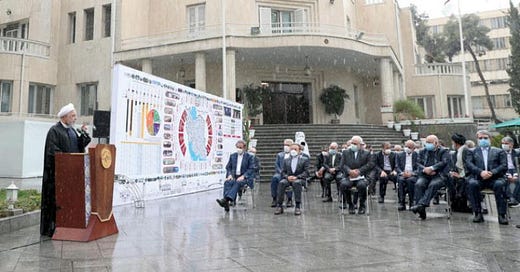Iran pre-elections politics seen blocking movement on deal return
A proposal western powers anticipated from the Iranian Foreign Minister this week has not materialized, as Iran President Hassan Rouhani blasts internal critics

There are increasing signs that Iranian internal politics may be preventing Iran from moving forward on a U.S. offer to forge a plan for the United States and Iran to fully return to the Iran nuclear deal, at least before Iranian presidential elections in June, American and European officials and some Iran observers believe.
Iran’s outgoing second-term President Hassan Rouhani on Wednesday blasted domestic rivals he charged with preventing Iranians from potentially receiving the economic relief that could come with the U.S. returning to the 2015 pact and lifting nuclear related sanctions.
“It is a great betrayal of the Iranian nation if any faction or person delays the end of the sanctions even for one hour,” Rouhani said in televised remarks on Wednesday, according to Reuters.
“The small minority that is obstructing this path needs to stop its destructive act. If it stops … the government can break the sanctions,” Rouhani added.
Meantime, a “constructive, concrete plan of action” that Iran’s Foreign Minister Mohammad Javad Zarif said on March 5 he would soon issue has yet to materialize.
“As Iran’s FM (foreign minister) & chief nuclear negotiator, I will shortly present our constructive concrete plan of action - through proper diplomatic channels,” Zarif tweeted on March 5.
U.S. officials had anticipated the Zarif proposal to possibly be issued sometime this week, but now seem uncertain if one is coming.
“Basically, I think increasingly people in the Biden team are coming to the conclusion that Iran’s domestic politics are proving to be an insurmountable obstacle to any diplomatic progress right now,” an Iran expert who consults with the U.S. administration, speaking not for attribution, told Diplomatic.
“My own view is that what Rouhani said yesterday gives credence to U.S. skepticism about Iranian preparedness to engage in serious diplomacy right now,” the expert continued.
“The reality is that the lack of movement is probably indicative of the fact that internally (in Iran) it has proven impossible to build a consensus on what an acceptable gesture for gesture would look like,” he said. “It should not be too difficult for the Iranians to put ideas on the table. But domestic politics just doesn’t allow it.”
The French foreign minister this week suggested that Iranian internal politics as it approaches its elections are complicating efforts to stabilize the 2015 pact, formally known as the Joint Comprehensive Plan of Action (JCPOA).
“There is a tactical problem and also an internal (issue) in Iran, which is in a particular situation because we are quite close to the presidential election in June,” French Foreign Minister Jean-Yves Le Drian told a French Senate hearing on Tuesday.
“We are sending signals to the Iranians so that we can have this return (to the nuclear deal), which would be the prelude to a wider discussion,” Le Drian said.
A European official suggested the impression that the window of opportunity may be behind us for momentum on discussions on how to choreograph a return for return option before Iranian presidential elections in June. Some had thought the potential for a breakthrough looked more promising in late February and early March. But back and forth with the Iranians since then has devolved into talks on talks, possibly because the outgoing Rouhani administration is being constrained by Iranian Supreme Leader Ali Khamenei and conservative rivals at home from moving forward.
Some in the US administration think that while that could be the case, it is also worth querying if there was really much of a window of opportunity open on the Iranian side a month ago that has since closed.
Domestic politics on both the US and Iranian sides have inhibited progress, said Ellie Geranmayeh, a London-based Iran expert.
“The problem is both the Iranian side and the U.S. side are finding it very tough to navigate the domestic political restraints,” Geranmayeh, deputy director of the Middle East program at the European Council on Foreign Relations, told Diplomatic.
“The restraints on the Iranian side were created by slow movement on the U.S. side on this file,” Geranmayeh continued. “And the slow movement on the US side by unnecessary hesitation about how re-entry to JCPOA would go down domestically.”
During the US presidential campaign, then candidate Biden talked about rejoining the deal and it was adopted as part of the Democratic party platform, Geranmayeh continued.
“The longer they put it off, the more complicated it has become for them,” she said.
Veterans of the Iran nuclear negotiations that produced the 2013 Joint Plan of Action (JPOA) and 2015 JCPOA say they are not overly pessimistic. We saw lots of this in the JPOA and JCPOA time frame, one observed.


